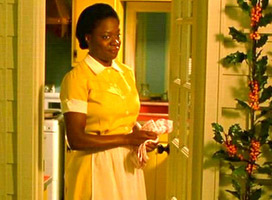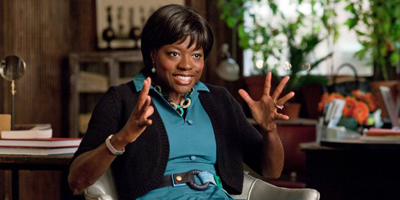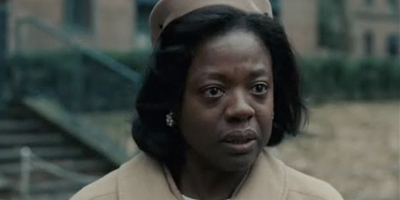Take Three: Viola Davis
 Sunday, August 21, 2011 at 12:28PM
Sunday, August 21, 2011 at 12:28PM Craig here with Take Three. Today: Viola Davis

Take One: Far from Heaven (2002)
Davis, currently elevating The Help as a long-suffering maid, had already supplied some hard home graft back in Todd Haynes’ 2002 race-and-homosexuality Sirkian pastiche Far from Heaven. Davis quietly excelled as Sybil, Cathy’s (Julianne Moore) full-time housekeeper and part-time confidant. She does a lot with a little. Ever present she curiously lingers within its most emotionally fraught scenes and makes a subtle impression in more incidental ones. Sybil maintains a watchful eye on proceedings, on how Cathy and Raymond (Dennis Haysbert) play out their furtive longing and on the arguments between Cathy and husband Frank (Dennis Quaid).

Whilst Moore is delicately cracking up due to wifely duties and illicit romance, Davis is on hand to help keep her together. “I don’t know how on earth I’d ever manage...” Cathy begins, cautiously trailing off. She knows her words reveal volumes about the very issues facing her, Raymond and indeed Sybil herself. Davis gets to assert her character as the narrative becomes more sweepingly emotional. She lets on to Cathy more about her life away from the Whitakers and, in her best moment, finally allows herself to tell Cathy about Raymond’s injured daughter. Davis plays the scene with a minor requisite guardedness. I can only imagine that had Haynes opted to fold more of another Sirk film, Imitation of Life, into his emotive meta-study, Davis may well have come front and centre.
Take Two: Eat, Pray, Love (2010)
Davis isn’t often, if at all, mentioned in synopses of Eat Pray Love. Her character Delia Shiraz, Julia Roberts’ best friend, isn’t significant enough to the overall narrative, apparently. This is a shame, as although she’s only in the first thirty minutes she’s its most resonant performer. In fact, I’d rather it had been about happily-married yet realistically cynical new mother Delia. There’s ample reason, given in a handful of scenes, that she would’ve made a far better lead character. Davis gets to flex her acting chops and be delightful regardless. But the best evidence of why she should’ve been the one doing the global traipsing is to be found in the lesser-seen only-six-minutes-longer director’s cut.

Before Roberts’ Liz jets off to vainly find herself across three continents, a rightfully sceptical Delia sees her off. It’s the first time Delia does more than provide mere friendly solace for Liz. "You know why I was giving you such a hard time?” Delia reluctantly says.
I love my job, my guy and my kid, but... I wish I could go."
Instead of coming across as lightly bemused or content, as in earlier scenes, Delia is starkly honest. Imagine the resounding emotional tug the film could’ve pulled for Delia’s plight (and with more at stake) had her and Liz traded places. Through Davis’ well-balanced turn, Delia exhibits a better understanding of life in one line of dialogue what takes Roberts’ Liz 133 minutes to grasp. Evidence, if any were required, that top-tier character actors are most often the ones doing the best work. With simplicity, Davis intriguingly suggests why Eat, Pray, Love should’ve been Let, Viola, Shine.
Take Three: Doubt (2008)
If anyone’s going to make mighty Mezzer Streep question her certainty it may as well be Viola Davis. In Doubt, her one-scene, barely twelve-minute role as Mrs. Miller, mother to a troubled boy at a Bronx Catholic school, was of course performed entirely alongside Meryl’s sister act. An hour in, Davis’ brittle, quietly astonishing and astutely underplayed performance causes a major Nunquake measuring 9.5 on the actressing scale. She totters along in dowdy beige coat, armed with pre-work accoutrement (she never lets go of brolly or handbag – she “only has half an hour” before work) and, with pin-point concision, razes the film’s emotional territory. And all before a noon shift cleaning floors!
Davis’ performance is open-wound acting of the rawest kind. It seeps through the celluloid, embedding within it a strain of desperate, matchless emotion. She steals the film outright from its trio of big hitters.

Mrs. Miller’s baffling, questionable revelations reverberate through the remainder of Doubt. Sister Aloysius (Streep) is understandably perplexed at her reactions, but defiant Mrs Miller seemingly overlooks her son’s current well-being in favour of his future betterment. The undertow of this sad, richly dramatic exchange displays a vivid understanding of 1960s race issues. Davis’ succinct performance allows valuable in-roads into Mrs. Miller’s life; she clearly deserved the highest accolades. If the Academy gave Judi Dench a statue for six minutes in Shakespeare in Love – ditto Beatrice Straight in Network – then they really should’ve given one to Davis for twice their time and quadruple their quality. But 11 other award nominations and six wins point to it being a lasting portrait of bleak determination none the less.
Three more key roles for the taking: Solaris (2002), State of Play (2009), It’s Kind of a Funny Story (2010)
 Doubt,
Doubt,  Eat Pray Love,
Eat Pray Love,  Far From Heaven,
Far From Heaven,  Oscars (00s),
Oscars (00s),  Take Three,
Take Three,  Viola Davis
Viola Davis 

